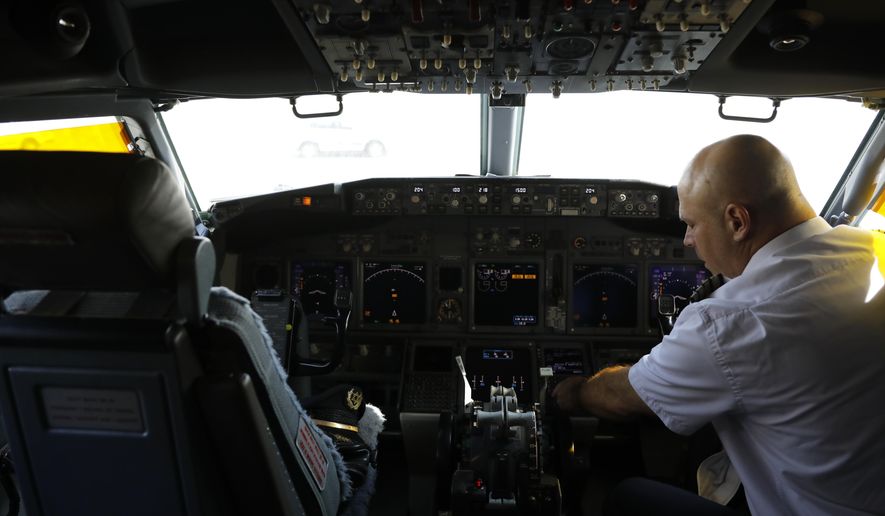Europeans are scratching their heads as aviation heavyweights duke it out with U.S. cellular providers over possible 5G interference with vital flight-safety systems.
U.S. telecoms delayed their Dec. 5 rollout of the new service for a month after the Federal Aviation Administration issued a last-minute warning that cell tower emissions near airports could interfere with aircraft automated landing systems and altimeters, the instrument shows a plane’s altitude.
Aircraft manufacturers say they still need more time to wrap their heads around the issue and say fielding the technology prematurely could cause an airline disaster.
A top trade group for the airline industry, Airlines for America, on Thursday filed an emergency request for the Federal Communications Commission to delay the rollout.
But Steffen Ring, a telecommunications consultant in Copenhagen who has worked on the European Commission’s rollout of 5G, said the cell-service upgrades simply haven’t posed an issue for flight safety across the Atlantic, despite the European Union’s rollout being well underway.
Mr. Ring said concerns about potential 5G interference with aircraft were raised in November as delegates from across Europe met for a plenary session, possibly in response to the back and forth over the matter in the U.S.
But there was little to discuss.
“Nobody spoke up,” he said. “It was absolute silence in the room. Forty-eight countries were participating, and there was absolute silence in the room.”
Mr. Ring said the FAA’s directives on the matter sent shockwaves across the globe, and he said given the concerns raised in the U.S., several European countries have begun studying 5G emissions near airports.
But there are no plans to slow the rollout in Europe, he said. And he thinks any further pause in the U.S. would be overkill.
“As long as there is no hard evidence, then everything is rolling out according to plan,” he said. “The European Commission is very keen that this go forward.”
Cell providers in the U.S. agree.
The same C-band spectrum earmarked for 5G in the U.S. is already used for 5G in dozens of other countries with no reports of interference to aircraft, noted AT&T and Verizon executives in a letter this month to FCC Chairwoman Jessica Rosenworcel.
Live flight testing by the French military and Norwegian Communications Authority also showed “no abnormalities,” wrote the executives, AT&T Vice President of Federal Regulatory Relations Joan Marsh and Verizon Senior Vice President of Public Policy and Government Affairs Kathleen Grillo.
After shelling out more than $81 billion in FCC service licenses in February, U.S. cellular providers are champing at the bit to light up the new frequency Wednesday. But after delaying their original rollout last month, aircraft manufacturers have continued to sound the alarm.
On the week of Dec. 20, Boeing’s Dave Calhoun and Airbus Americas’ Jeff Knittel cosigned a letter to Transportation Secretary Pete Buttigieg warning that moving ahead with the 5G rollout could have “an enormous negative impact on the aviation industry,” including if the FCC does not put additional safeguards in place.
The cellular providers say the fears are overblown about 5G zapping flight altimeters and automated systems that help airplanes land.
AT&T and Verizon have proposed added precautions limiting cell tower emissions near airports, but aviation experts say the safeguards don’t go far enough.
Airlines for America said the FAA would be forced to ground thousands of flights once the rollout begins unless the FCC and telecoms come to the table with a workable solution. The restrictions would affect more than 35,000 passenger flights and cost more than $1.7 billion in annual operating costs, the group said.
But Ms. Marsh and Ms. Grillo said the timely rollout of the technology is “critical to the U.S.’s global leadership.”
“China’s current market position with respect to 5G equipment has raised not only economic concerns, but also fears about whether security vulnerabilities in Chinese equipment might pose threats to national interests beyond simple third-party hacking,” they wrote in the letter. “Unfortunately, any further delay in the launch of C-band for 5G will not only set back U.S. 5G leadership, but it will also undermine the credibility of U.S. technology leadership, and, potentially, U.S. efforts to promote a more secure and trusted global communications infrastructure.”
Cellular Telecommunications Industry Association President and CEO Meredith Attwell Baker said in a November op-ed that further delay could cause real harm. She said a one-year delay would subtract $50 billion in economic growth, “just as our nation recovers and rebuilds from the pandemic.”
The FAA and the aviation industry, she said, are forcing “a false choice the United States need not make.”
In a joint statement from CTIA, Airlines for America, and the Aerospace Industries Association, the groups announced that they would “work together to share the available data from all parties to identify the specific areas of concern for aviation.”
“The best technical experts from across both industries will be working collectively to identify a path forward, in coordination with the FAA and FCC,” the groups said. “Our belief is that by working collaboratively in good faith on a data-driven solution, we can achieve our shared goal of deploying 5G while preserving aviation safety.”
—
Correction: An earlier version of this story misspelled Mr. Ring’s first name. It is Steffen.
Correction: An earlier version of this story incorrectly reported the date of the letter sent to Mr. Buttigieg by Boeing and Airbus executives. It was sent the week of Dec. 20, 2021.
• Joseph Clark can be reached at jclark@washingtontimes.com.




Please read our comment policy before commenting.